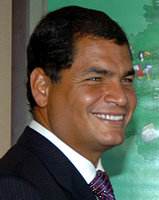Editor's note: This is the second of a two-part series examining Ecuador under President Rafael Correa. Part I examined Correa's domestic policy. Part II examines his foreign policy.
Ecuadorean President Rafael Correa's radical "Citizen's Revolution" has surprisingly translated into a foreign policy marked by pragmatism. Some of his moves -- such as embracing China, Russia and Iran -- have raised eyebrows, while others, such as the forced restructuring of Ecuador's foreign debt, have prompted some foreign investors to question the wisdom of making long-term investments in the country. But his administration has also restored full diplomatic and commercial ties with Colombia and successfully held the rotating presidency of the Union of South American Nations (UNASUR). On the whole, Correa has been less inflammatory on the international stage than domestically.
In 2008, Correa became the first Ecuadorean president to visit Tehran, where he signed an energy agreement. But if Correa's Iranian overtures predictably irritated Washington, they have not gone down well at home either. By supporting and occasionally praising the leaders of repressive regimes, Correa has alienated some of his domestic constituency. His failure to support the efforts of popular movements in those countries to achieve political representation contrasts poorly with Correa's claims to be a champion of expanding representation for Ecuadoreans. When confronted with such arguments, however, Correa has reacted angrily. And after the international Financial Action Task Force blacklisted Ecuador over its lackluster contribution to the global fight against money laundering, Correa called the move revenge for having forged closer ties with Iran.

